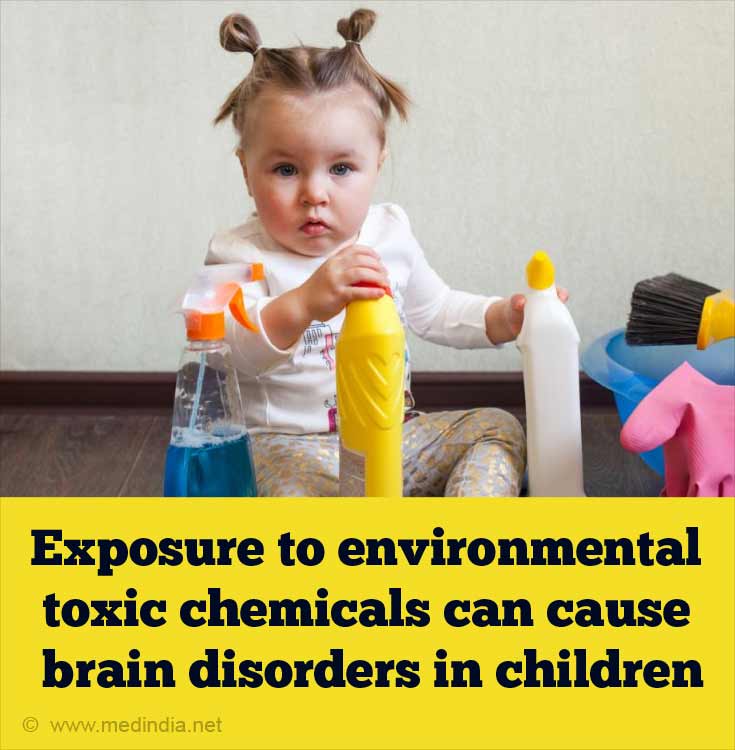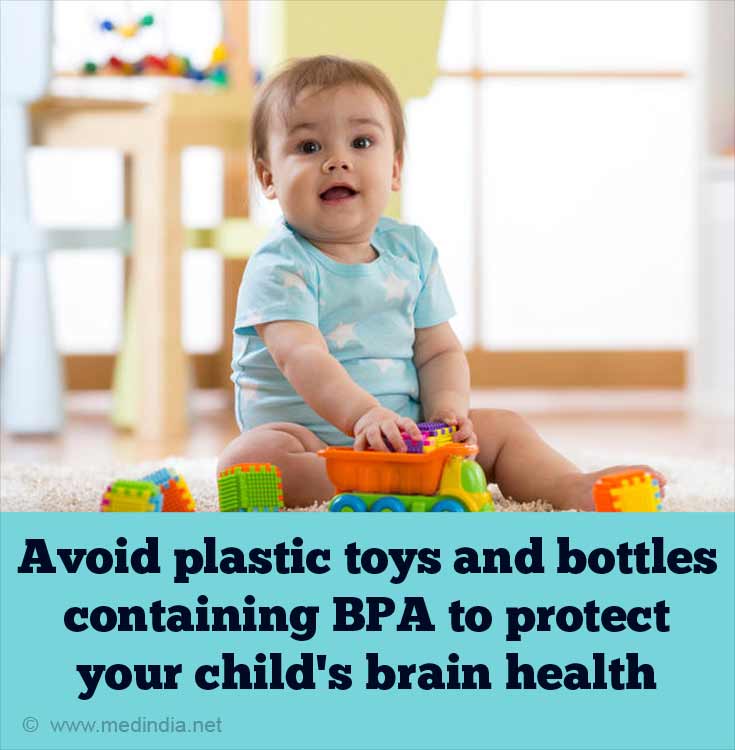Effect of Toxic Chemicals on the Brains of Babies and Children
Toxic chemicals have been found to affect the normal functioning of genes, proteins and other key molecules in the brain cells, more so in the developing brain of children and can cause neurodevelopmental disorders such as dyslexia, cerebral palsy, attention deficit hyperactivity disorder (ADHD), behavioral and learning problems.

Chemicals frequently found to cause neurodevelopmental disorders include lead, mercury, manganese, fluoride, tetrachloroethylene (organic solvent), dichlorodiphenyltrichloroethane (DDT), and chlorpyrifos a pesticide among others.
- Lead disrupts the functioning of key chemicals or neurotransmitters in the brain including acetylcholine, dopamine and glutamate
- Mercury affects the function of key enzymes in the brain cells thereby hindering brain development
- Another potential cause of harm to the fetus and child brain includes the informal processing of e-waste (electronic waste) such as used cell phones, stereos, etc to recover metals. Women living in these areas are exposed to high levels of metals, organic pollutants and flame retardants
Several hundreds of chemicals that are widely used and have been at one time or the other linked to neurodevelopmental disorders remain unregulated and continue to be used. These include chemicals in food packaging material that may leak into food and phthalates found in cosmetics, perfumes and lotions can increase the risk of preterm birth in women.
Even a reduction in IQ by a mere 5 points can have far-reaching consequences such as loss of earning potential,more accidents due to distracted driving, costs incurred by family and healthcare system towards special education and other indirect costs, according to scientists.
To sum up the seriousness of the problem with the remarks of one of the scientists working on this subject, Phillippe Grandjean of the Harvard School of Public Health, "If the next generation does not have the cognitive skills that we hope they will have, they will not be able to clean up after us... or care for us."
15 Chemicals That Can Damage Your Child’s Brain
Here are the 15 chemicals that can damage your child’s brain.
1. Lead – One of the most widely researched toxins and a chief constituent of lead water pipes, and paints. Causes irreversible brain damage and low IQ. No safe level of exposure recommended.
2. Methylmercury – Fetus in utero is exposed when the mother consumes fish containing high levels of mercury such as tuna. The methylmercury passes via the placenta into the fetus and impairs brain development.
3. Arsenic – Exposure to arsenic occurs chiefly from groundwater contamination. It is also used in semiconductors, wood preservatives and pesticides. Arsenic exposure in children can cause learning difficulties and impaired understanding and thinking abilities.
4. Polychlorinated biphenyls (PCB) – This family of chemicals is present in food and is passed to the baby via breast milk. Exposure to PCB has been shown to cause impaired brain development during infancy and childhood.
5. Toluene – Toluene is an organic solvent and exposure in mother can affect the brain development of the fetus according to reports published by the Environmental Protection Agency (EPA) and Occupational Safety and Health Administration (OSHA).
6. Manganese – Manganese, an air pollutant can contaminate drinking water. There is evidence that manganese exposure in children can cause delayed brain development with poor intellectual capabilities, low math scores and ADHD.
7. Fluoride – High fluoride levels in water (> 1mg/L) has been shown to lower IQ levels in children. Certain parts of China and India naturally have high fluoride levels.
8. Pesticides – Dichlorodiphenyltrichloroethane (DDT) and Chlorpyrifos are pesticides known to affect brain development and cause structural abnormalities in the brain. These have been banned in several countries including the US but continue to be available in low and middle-income countries. These have recently been associated with Alzheimer’s disease as well.
9. Bisphenol A (BPA) – This chemical is known to disrupt the endocrine system and also strongly linked to delayed brain development in children. It is commonly used as an additive in the plastic industry.

10. Phthalates – This chemical is used in cosmetics, nail polish and hair sprays. Exposure in childhood has been shown to cause poor ability to interact socially and a short attention span.
11. Tetrachloroethylene – This is an organic solvent and women working as nurses, chemists, beauticians and hairdressers are at risk of exposure to high levels and their babies are at increased risk of showing aggressive behavior, hyperactivity and psychiatric problems.
12. Polybrominated diphenyl ethers – Exposure of the fetus in utero to polybrominated diphenyl ethers (PBDEs) found in flame retardants (used in furniture, electronic gadgets and polyurethane foam) may result in lower IQ and hyperactive behavior in kids. The substance has been now regulated but it can persist in the environment for several years.
13. Ethyl Alcohol – Alcohol is found in several beverages such as beer, wine, rum etc and is widely consumed socially. Fetuses exposed to alcohol due to maternal drinking have impaired brain development and may experience hyperactivity, aggression, learning and memory deficits, behavioral problems (drug and alcohol abuse), and poor social and communication skills.
14. Nicotine – Nicotine is the main constituent of cigarettes and exposure of fetuses to nicotine in cigarette smoke has been shown to retard brain development including speech defects, poor attention span and irritability.
15. Thalidomide – Thalidomide is a drug used as chemotherapy to treat multiple myeloma, Crohn’s disease and HIV. Exposure during pregnancy can lead to the birth of babies with brain defects and mental retardation.
Measures to Prevent/Reduce Toxic Chemical Exposure in Children
- Avoid smoking and alcohol during pregnancy
- Use water filters and other safety measures at home to reduce drinking water
- contamination
- Avoid using paints containing lead
- Avoid spraying chemical insecticides and pesticides
- Wash vegetables thoroughly before cooking since they may be contaminated with chemicals
- Eat fish that are low in mercury and do not dispose of mercury thermometers’ in the trash
- Clean, mop and dust the house regularly since toxic chemicals such as lead, pesticides and flame retardants occur in house dust
- Use non-toxic cleaning products in your house eg baking soda, vinegar
- Use natural cosmetics and non-toxic personal care products; avoid chemical containing beauty products
- Do not wear outdoor shoes inside the house since they may bring toxic chemicals into the house
- Avoid high animal fat containing foods since toxic chemicals build up in animal fat
- Avoid tinned food and beverages as the lining of tins contains a toxic chemical BPA
- Say no to plastics and plastic containers. Avoid storing hot stuff in plastic containers and heating plastic containers in the microwave since heat releases toxic chemicals from the plastic into the food






